- Home
- Conn Iggulden
The Gates of Athens Page 22
The Gates of Athens Read online
Page 22
He stood for a long time watching the voting. There was no clear pattern. Men of the outer city came up and deposited a piece with his name inscribed on it. Neither was there malice in their expressions, not for the most part. He was pleased at that. Yet as a rumour will feed on itself, so the process of voting brought more and more to the Pnyx. There was an excitement in the air and Aristides wondered how many would vote without even knowing who it was they would send into exile.
As the sun rose higher, he could not stand and merely observe any longer, not with Themistocles watching him. Aristides climbed the steps and saw how young men bristled around both Cimon and Themistocles. Their masters patted the air or murmured instructions to them so that they stood back and let Aristides approach. The voting went on as Aristides drew up and halted. Cimon was too drunk and too young to concern him, he decided. Instead, his gaze was on Themistocles.
‘One by one…’ Aristides said. ‘You remove your competitors one by one.’
He waited, but Themistocles only gave the smallest of shrugs, while Cimon scowled in confusion.
‘And what will you do now, Themistocles?’ Aristides asked. ‘Once I have been driven out?’
‘I serve the city, Aristides. I am not responsible for the tides, nor individual votes.’
‘Your answer demeans you. Can you not be honest? Here today, as they vote? Cimon has returned a favour, has he not? He has lent you his support today, with all those who look to him.’ Aristides took a deep breath, calming himself. ‘You have taken my position in the city from me. All I love. Will it be worth it, do you think?’
For the first time, Themistocles flushed, looking embarrassed.
Cimon sneered through his fog.
‘You are the old… generation, Arilsid… Aritsid…’
Both Themistocles and Aristides ignored him.
‘The people fear tyrants, Themistocles, with good reason. They will not let one man rise to rule, not without tearing him down. How long will you last, without me to stand on the other side of the scales? How long before they see you stand alone?’
‘I do not seek power,’ Themistocles said loudly. ‘I don’t interfere at the docks and report back to the council. I don’t speak in every debate as if I am the only adult, as if my opinion is the only one worth hearing.’
‘Your humility is refreshing,’ Aristides said. ‘I’d hoped for honesty from you, but I see there are too many ears around.’
He stepped away to look into the urn. The latest epistates was a stranger to him and didn’t react as he peered in. Aristides nodded to himself.
‘I see enough votes there. Ten days. Very well. I will prepare my estate.’
He was trembling with anger by then, so that he felt light-headed. He did not look at Themistocles again, though he felt the man’s triumphant gaze follow him down and across the Agora.
Aristides unclenched his fists with an effort as he walked through the city he loved. He’d thought Themistocles had understood enough of the Assembly to put aside personal ambition. Athens needed the constant clash of wits to thrive, Aristides believed with a passion. His beloved city was more than just households and a city wall! She was an idea, of rule by the people, hammered on the forge every day, in trials, in debates, even in war. He accepted those laws, even though he knew Themistocles had made them work for his ends.
A thought struck him, making Aristides stumble. Had Themistocles been part of the downfall of Miltiades? Had he whispered in the ear of Xanthippus, perhaps? After that, a pact with Cimon? Aristides stopped walking for a moment, feeling suddenly cold. Had Themistocles put him forward as archon for the year? That honour had raised him up – and then his people had cut him down. Perhaps none of it was simple chance. Perhaps it was all a campaign. It left Themistocles almost alone in the city – and popular enough that he would not have to fear the broken pots himself. Still, the man had chosen to leap onto a wild horse. Sooner or later, he would be thrown.
The rejection by the people hurt deeply. Aristides did not weep or rage, however, not even when he was in his private rooms and there was no one to hear. He sat for a time in silence. There was no wine in his town-house, so he drank three cups of water and washed away the red dust that still clung to him. After that, he began to order his affairs, so that he could be ready. He was forty-eight years old. The thought of ten years away from Athens was like a hot forge-iron laid across his heart. Themistocles had taken almost everything from him. Yet his dignity and his honour were intact.
PART TWO 482 BC
26
Xerxes stood with his eyes closed after his climb, letting the sea breeze cool his skin. Abydos was a town built of ancient villages on the north-west coast, the very edge of empire. He wondered if it would ever amount to more unless they could build stone bridges across the deep water. His engineers said it was impossible to throw arches across so great a span, not with open sea running in between. Yet he had faith, in the ingenuity of his people, in the favour of angels. His father had once placed a bridge over the strait at Byzantium, only to see it smashed in storms. Xerxes had vowed to go further. To the west of Byzantium, he would span the Hellespont. His army would walk over the sea.
From the top of the hill, he could see another coast of brown and green across the water. Xerxes recalled his maps, produced for the eyes of kings and no one of lesser estate. Once the armies of his father…
He paused, caught up in old patterns. Xerxes breathed out, emptying himself. He had mourned. Forty kingdoms had grieved with him. It was four years since his father had died. There had been times since when all life had seemed unbearably petty, when the empire had gone so long without a shepherd that they had fallen into rioting and insurrection. Slowly, Xerxes had rebuilt his faith, both in life and himself. He had shaken off the vast perspective, the feeling that his entire life was merely marking time until he saw his father once again. No. Xerxes was now the Great King of the empire. He would live first.
Once his armies set foot on that far shore, that slender peninsula, they could march through Thrace and west into Macedonia, into lands they did not know, coming south at last to crash against the cities of Greece like a great wave. Xerxes had not forgotten his father’s vow. King Darius had left only one thing unfinished, in all the richness and wonders of his life. Death had stopped him, but a man’s sons could still act after his death! That was the very purpose of sons, to cheat the natural ending of ambition. Xerxes smiled at the thought. He had put his seed into the belly of his wife before leaving the heartlands. Amestris had promised him a son, a crown prince he could raise to greatness, as Darius had done. To make certain, she had buried seven boys alive, taking them from the families of small kings. It was a grand sacrifice, he thought, a gesture typical of her and touching in its faith. Perhaps, too, it was a reminder for him to be faithful. His father had once warned him to be wary of a woman who might watch while he slept. All the strength and authority in the world were as nothing while a man snored.
The breeze picked up, stirring dust around his feet as it passed by. Xerxes shaded his eyes and looked at the immense labour still continuing below. He had not failed to honour his father. That simple truth was written in the regiments moving like beetles on the land, in the great fleet that bobbed at anchor and grew every month. The labour and the costs and the training were sums unimaginable. Xerxes had sent his accountants away in the end, when they had grown worried and fearful. What was the purpose of wealth if not to make war on the enemies of his people? What good did it do to eat from plates of gold, to sip wine from jewelled cups, if Greeks still lived and laughed and scorned his father’s memory? Xerxes had no need for a slave to whisper into his ear each evening. He could not forget the Greeks. In his dark times, he wondered if the defeat at Marathon had brought on the illness that had led to his father’s death.
Xerxes found himself clenching his fists. He opened them slowly, seeing his palms had whitened with strain, like dead flesh. He had made one final attempt at emulating t
he greatness of his father. He had sent men in peace to every Greek city, offering vassalage, for dust and water. If Athens and Sparta had accepted his rule over them, he would have shown kindness, in his father’s name. He told himself it was true. Darius had made him understand he had to be more than a king to rule an empire. He had to do everything he could to appear merciful. More, if they allied themselves to him, his new subjects had to be certain he would protect them, even against their own.
It was a hard path for him to walk, almost impossible. Many of the lesser Greek states and cities had accepted his offer, out of fear or love, it did not matter. Yet when Xerxes heard Athens had put his envoy on trial and executed him, it had been with a sort of joy. Sparta had thrown theirs into a well. He had actually laughed at the news, he remembered. The high path was too much for him and it was truly a relief to be able to put it aside. His offer had not been made from weakness after all, but from strength.
Xerxes was young and strong and certain, with an army and fleet without equal. He was pleased they had scorned him, without honour. It would make what followed all the sweeter. In putting down rebellions in Egypt after the death of his father, he had discovered he did not enjoy the destruction of the weak, not particularly. He had slaughtered the populations of entire cities to make sure they understood a Great King still ruled, but not because it gave him any pleasure. A warrior’s pleasure came only from facing the strong – and destroying them so utterly they would never rise again. The moment when the cities of Athens and Sparta realised they would not be allowed to retreat, that they would be taken brick from brick and left as blood and dust, that would be his father’s legacy.
It was a glorious thought, an intoxicating one, as if he drank wine in the cool air that filled him with every breath. He could see other hills around Abydos and right across the channel, the lands there that would lead to the west. Perhaps one day he would see stone bridges across it, joining a new western empire to the greatness of Persepolis and Babylon. He was in the prime of his youth. He had time. He would stroll through the ruins of Athens then, and tell his son about Darius.
Hearing the creak of armour drew his attention back from the infinite and the years ahead, so that Xerxes looked down the steep slope to where General Mardonius was making his way up. When he reached the crest of the hill, Mardonius threw himself to the ground. Xerxes signalled two of his watchful spearmen to let the man approach.
The general wore a panelled coat and a sword on his waist. Though the sun beat on them both, Xerxes was pleased to see Mardonius breathing only lightly. The general insisted on high levels of fitness in his men, unlike some of the lesser commanders. Xerxes too demanded it in those who served him, saying they owed the strength of their bodies to the throne. He could not abide softness of flesh, in himself or in those around him.
‘Rise, Mardonius. See what a host I have brought to this place. Is it not magnificent?’
The two men stood side by side for a time before Mardonius replied. The view revealed an army like cities on the move, with a fleet of eight hundred ships in the strait and more coming in every day. This would be no tentative blow, as at Marathon. All the rebellions had been crushed. Xerxes was at last bringing the entire might of the empire to the western coast.
‘It is a wonder, Majesty,’ Mardonius said. His eyes darted back and forth as he drank in the scene. Xerxes nodded, pleased his general was using the perspective as he had intended.
‘I have reports of the food caches in Thrace,’ Mardonius added. ‘They came under attack by some local king there, but our soldiers fought them off and burned their villages.’
Xerxes waved that away. The problem of feeding such a host was one he could solve with sufficient will, wealth and slaves. The empire spread like spilled honey, infinitely slow but unstoppable, covering the world in sweetness. His marching columns had supplies waiting for them at a dozen places on the other side of the Hellespont. His ships had been landing men and equipment for over a year, with local agreements enforced with gold or slaughter. It had not mattered to him how it was done. His order had been enough.
‘Good. My father would be proud, I think.’
‘He would, Majesty. He is,’ Mardonius replied.
The man chose to drop to one knee and bow his head at the honour of speaking of the departed Great King. Xerxes smiled.
‘He will be,’ he corrected, after a time. ‘I will command the fleet, general. I will close down the sea to the Athenians, like a fishing net drawn along the coast. At the same time, you will take the army across the Hellespont and march west with us. I will meet you in the ashes of Athens and we will shake hands then. Do you have any other questions for me?’
Mardonius thought for a second, rubbing a hand through the thick blackness of his beard, where his lips showed red and his teeth white as he smiled.
‘When will the floating bridge be finished?’ he said, after a time. The question made nothing of what would be one of the marvels of the age, if their engineers pulled it off. The Hellespont had never been spanned, not in ten thousand years.
‘The first hulls will be in place today,’ Xerxes said, pride showing. ‘Persia is the light of the world, Mardonius. We have machines to draw wind from the air, water from the ground. This is merely the work of slaves – of ropes and wood and piles sunk into the mud beneath. Master Baloch tells me they will be stable enough to cross in a month, barring storms. If the crossings survive the winter, you will ride across that strait in spring, general, without the sea wetting the hem of your coat. I will set sail on the same day. With God’s favour, we will achieve our victory before the end of the year.’
‘The Greeks will surely know we are coming,’ Mardonius said. He bit his lip at the thought, but he was the leader of all the armed forces of Persia and he worried about overconfidence.
‘Of course they will,’ Xerxes replied. ‘They have had spies in Ionia since they burned Sardis, reporting back in whispers. Half the people on this coast claim ties of blood to the Hellenes. They talk and write and warn every day. It does not matter. No doubt, too, they will have noted our supplies in Thrace and marked the likely route we will take.’
‘Such things do not concern you, Majesty?’
Xerxes looked down the hill to the port and the far coast disappearing into the haze.
‘I have brought a million men to this place, general, as well as warships of Phoenicia and Egypt. I have not stinted in their training or their weapons, or food to keep them strong. I have done all this because the Greeks will know we are coming. On my order, our people have begun a canal across part of the route, so our fleet can avoid a treacherous piece of coast – and sail in safety where there was once only land! Nothing has been spared for this, not gold or men or blood. I have made preparations since my father’s death – while he drove the empire to this great action before.’
Xerxes paused and bowed his head at the mention of his father, before going on.
‘It is eight years since Marathon, general. My father’s illness robbed him of the vengeance he deserved. I will put that right, in honour of his shade. After all, they’ve known we would come since then, if they had the sense of a child. No, there is no way to keep an army of this size a secret. Yet that is my greatest joy.’ He showed his teeth then, like a wolf. ‘They will know we are coming and they will try to resist – until they understand we are the wave that will break their walls, no matter what they do. We are the tide coming in, the end of all their dreams and ambitions. We are the fire that will burn them to ash!’
His voice had risen with each phrase, until it was almost a battle shout. On instinct, the general chose to prostrate himself once again, his hands touching his ears. Mardonius was a man of great personal and physical strength, who had served Xerxes’ father with distinction. The sight of him lying in the dust cooled the ardour that surged in the young king.
He reached and took Mardonius by the arm, raising him up. It was an honour to be touched in such a way and Mardonius
flushed like a bride, overcome.
‘I shall not fail, Majesty. It will be as you say.’
The attention of the king was on the strait below, where ships and men swarmed.
‘Look there, Mardonius, at the banks. Do you see?’
Far below, a ship had come down the strait and been lashed to the wooden quayside with great ropes of papyrus and white flax, thick as a man’s arm. As both general and king watched, another approached, looking like a child’s model at that distance. It came alongside the first, sculling closer until they touched. Both ships dropped anchor at prow and stern, then more ropes were flung over, rising like threads. Men scurried everywhere, busy in the heat as they joined the ships.
Sails came down and were removed and piled on the shore. Spars and ropes followed and then the great wooden beam of a balance crane was heaved over, with dozens of men working to unship the mast. A net of stones as counterweight helped them to lift out the great bole of pine, swinging it round.
‘I see, Majesty,’ Mardonius said.
‘Yes. They pull masts like teeth to make my path across the waters.’
Onto the open hulls came more carpenters, carrying boards and pegs, drills and hammers. Xerxes smiled to see planking begin to fill the space, the first steps on a wide road that would reach right across the strait when it was done. His father had shown the way, at Byzantium. He had not made a bridge of stone, but of ships. His people would step from land to land.
‘I could have had the fleet carry my soldiers, though it would have taken an age and lost me another campaign season. This is a grand gesture, a signal of my intent. Do you see, general? It shows we will not be stopped. Let the Greeks report I have tamed the sea, Mardonius. That I have no limits in all I devote to this.’
The general looked over at him, his eyes showing awe.
‘It is true, then? Your Majesty went down to the coast and lashed the ocean?’
‘With a stick, yes. Three hundred lashes – and then I branded it with heated irons. I did it where a Greek fishing crew could watch me. Oh, their faces! You should have seen it.’ Xerxes laughed in happy memory. ‘They were so afraid, general! Like children. I do not fear their Poseidon. Even his sea is my servant in this. I will not be turned back. “Remember the Greeks,” Mardonius. That is what my father’s slave used to say. I tell you this: when I am finished, they will remember me.’

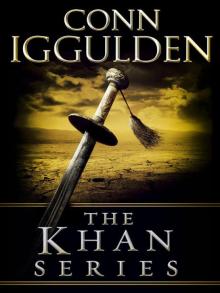 The Khan Series 5-Book Bundle
The Khan Series 5-Book Bundle Tollins 2: Dynamite Tales
Tollins 2: Dynamite Tales Tollins: Explosive Tales for Children
Tollins: Explosive Tales for Children The Field of Swords
The Field of Swords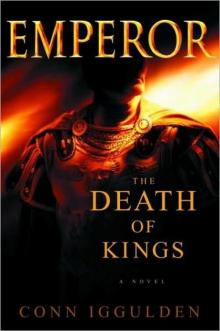 The Death of Kings
The Death of Kings Quantum of Tweed: The Man With the Nissan Micra
Quantum of Tweed: The Man With the Nissan Micra Bones of the Hills
Bones of the Hills Genghis: Birth of an Empire
Genghis: Birth of an Empire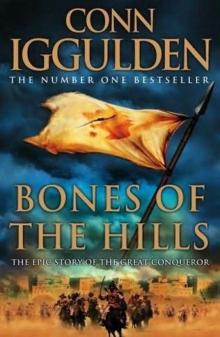 The Gates of Rome
The Gates of Rome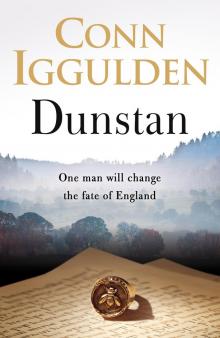 Dunstan
Dunstan Fig Tree
Fig Tree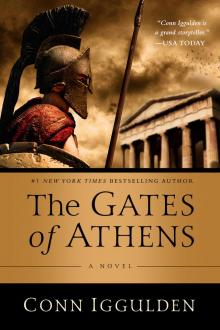 The Gates of Athens
The Gates of Athens Stormbird
Stormbird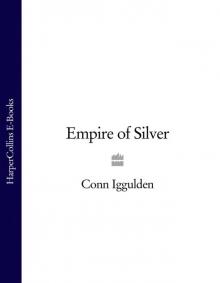 Khan: Empire of Silver
Khan: Empire of Silver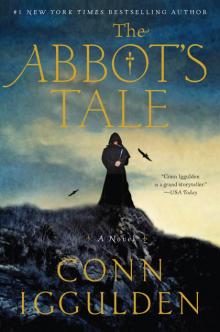 The Abbot's Tale
The Abbot's Tale Gengis: Lords of the Bow
Gengis: Lords of the Bow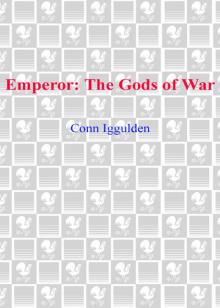 The Gods of War
The Gods of War Blackwater
Blackwater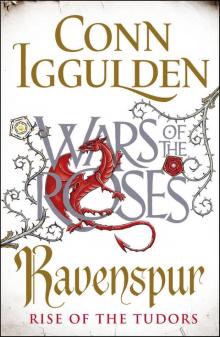 Ravenspur: Rise of the Tudors
Ravenspur: Rise of the Tudors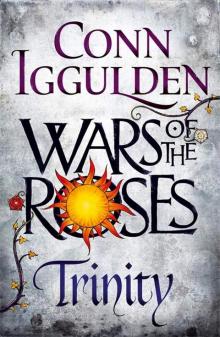 Wars of the Roses: Trinity (War of the Roses Book 2)
Wars of the Roses: Trinity (War of the Roses Book 2) The Gods of war e-4
The Gods of war e-4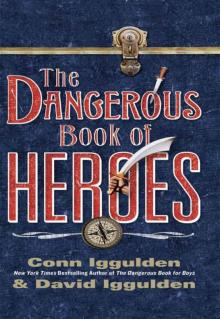 The Dangerous Book of Heroes
The Dangerous Book of Heroes Stormbird wotr-1
Stormbird wotr-1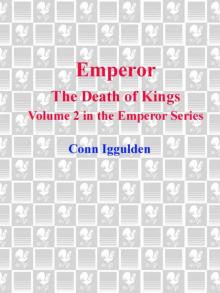 Emperor: The Death of Kings
Emperor: The Death of Kings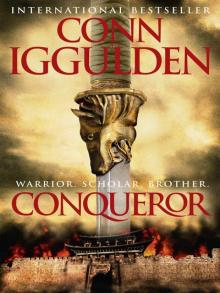 Conqueror (2011) c-5
Conqueror (2011) c-5 The Dangerous Book for Boys
The Dangerous Book for Boys Genghis Lords of the Bow
Genghis Lords of the Bow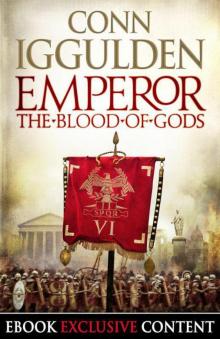 Emperor: The Blood of Gods (Special Edition) (Emperor Series, Book 5)
Emperor: The Blood of Gods (Special Edition) (Emperor Series, Book 5)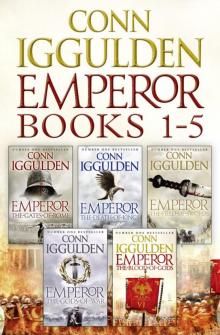 The Emperor Series: Books 1-5
The Emperor Series: Books 1-5 Lords of the Bow c-2
Lords of the Bow c-2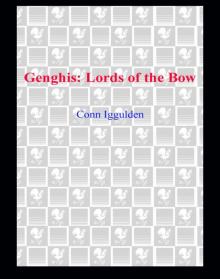 Lords of the Bow
Lords of the Bow Quantum of Tweed
Quantum of Tweed Wars of the Roses 01 - Stormbird
Wars of the Roses 01 - Stormbird Empire of Silver c-4
Empire of Silver c-4 Birth of an Empire
Birth of an Empire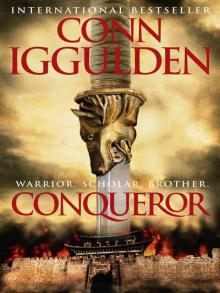 Conqueror (2011)
Conqueror (2011) Wars of the Roses: Bloodline: Book 3 (The Wars of the Roses)
Wars of the Roses: Bloodline: Book 3 (The Wars of the Roses) Bones Of the Hills c-3
Bones Of the Hills c-3 Empire of Silver
Empire of Silver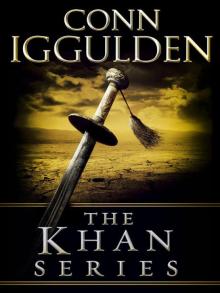 The Khan Series 5-Book Bundle: Genghis: Birth of an Empire, Genghis: Bones of the Hills, Genghis: Lords of the Bow, Khan: Empire of Silver, Conqueror
The Khan Series 5-Book Bundle: Genghis: Birth of an Empire, Genghis: Bones of the Hills, Genghis: Lords of the Bow, Khan: Empire of Silver, Conqueror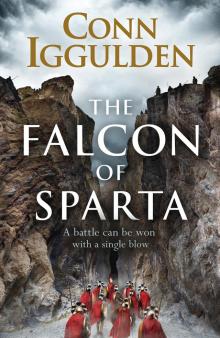 The Falcon of Sparta
The Falcon of Sparta Explosive Tales for Children
Explosive Tales for Children